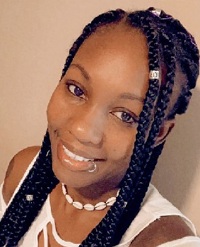A Bridge to Better Patient Care

Kiarra Hehn
Therapist, Peace by Piece Counseling Services
Kiarra Hehn started her career working with youth in drug and alcohol counseling. She quickly discovered that other issues, like trauma and mental health needs, were intertwined in her young clients’ lives, and she knew she needed more training to better help them.
Kiarra turned to the Master of Arts in Applied Child & Adolescent Psychology: Prevention & Treatment program at the University of Washington to elevate her skills. “This was the bridge I needed for the tools and skills I was missing.”
How did you get interested in the field of child and adolescent psychology?
What initially drew me was that I was a teen mom. I had my oldest at 17, so I’ve always been very interested in the complexity of parenting and having children. I’m interested in figuring out what kids are doing and why they’re doing it.
Drug and alcohol counseling has also been near and dear to my heart. So I started on that route and quickly learned that there’s an immense need for services for youth. These youth have a lot of trauma and mental health issues, and there’s a lot around the two needing to be bridged. But I didn’t have those tools. I started researching programs and saw this field as a kind of bridge for the tools and skills I was missing to better help the clients I was seeing for drug and alcohol counseling.
Tell us about your current role.
I’m currently in private practice. I love working one-on-one with people and having the freedom to use one or more modalities that connect and resonate with each individual. I come from different cultural backgrounds, and it was really important to me to make a space that felt safe for people who identify with different practices and different ways that they heal.
What do you find most satisfying about your work?
What fulfills me is the connection that I get to build with a lot of my clients. As we know, there aren’t a lot of Black and Indigenous therapists in general, and specifically in the substance use world. I work a lot with Black and Indigenous clients and clients of color. And a lot of times what I hear is just the safety that they feel around not having to explain certain nuances and complexities in their world.
I also work with youth who come from communities that I come from and have some experiences that are similar. Again, it’s creating that safety and that they don’t feel like they have to explain their whole life. That’s not something I had growing up, and I know that’s the story for a lot of people I’m around. It’s very fulfilling to help change that narrative.
How did this program help you advance your career?
My end goal was private practice, and you cannot be a private practice therapist without at least a master’s degree, so I definitely went into this degree with that in mind.
The other part was I have lived experience and community experience, and I have a background with substance use, but there was a missing piece I needed to help me bridge all of that. I wasn’t familiar with the tools, skill sets, modalities and psychoeducation that could help me help my clients understand themselves differently until I got this degree.
Why did you choose to study at the UW? What aspects of the program appealed to you?
I mean, it’s the UW! Everybody loves the UW. Also, as a full-time student, the accelerated time frame, compared to other programs, seemed manageable. It was during the pandemic, and I thought, with schools shutting down, I have an opportunity right now while I’m at home to hone in and focus on this.
What kind of connections did you make with other students in the program?
We had a BIPOC group where we could hold space for one another and help everyone navigate things. We had Zoom nights where we’d talk, and it was a safe space to ask questions — it would help others who had the same question.
When you come from communities and backgrounds that don’t have a lot of experience with higher education, it’s like another language you have to learn. And some of us in the cohort were already learning in a second language, so we spent a lot of time just translating things together.
What would you say to someone who is thinking about applying to this program?
I would say know your why. Make sure you know why specifically you’re interested in this program and that it has what you want to get out of it. Also, this is a master’s program, so it can feel very overwhelming. So make sure you have a support group and that there’s space for you to breathe outside of school.
We need more therapists. We need people who come from so many different walks of life to be able to be safe spaces for those who come from those walks of life and don't have that space. I’m excited for the students who want to take this step!